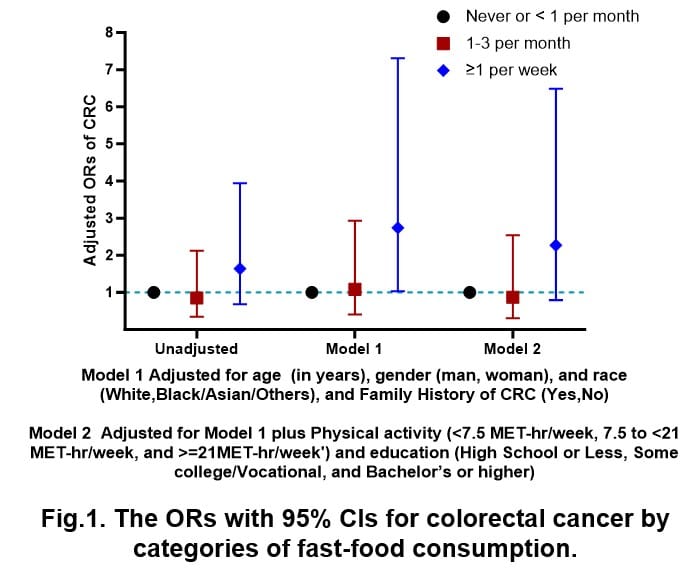Cancer
Association of fast-food consumption with colorectal cancer (CRC) incidence among Louisville Environmental Assessments Pilot Study in Colorectal Cancer (LEAPS-CRC): a clinical case-control study. Jeevan Adhikari* Jeevan Adhikari Sandy Kavalukas Allie Jin Olufunmilayo Babarinde Natalie DuPre
Background: Colorectal cancer (CRC) is the 3rd most common cancer in the US with Kentucky reporting the 2nd highest incidence rate of CRC. Fast-food consumption is associated with CRC risk factors (ex. obesity, physical inactivity), and its nutritional components (ex. red and processed meats) contribute to CRC risk. Studies suggest that higher fast-food consumption increases CRC incidence; however, most studies were outside of the US.
Hypothesis: Regular fast-food consumption increases CRC incidence.
Methods: The Louisville Environmental Assessments Pilot Study in CRC (LEAPS-CRC) is an ongoing clinical case-control study that started in August 2023. Consented participants were recruited in a surgical clinic, where CRC cases and controls underwent a surgical CRC treatment or screened negative on a colonoscopy, respectively. Participants completed a questionnaire that captured information on several CRC risk factors. Participants were asked how often they ate food from McDonald’s, KFC, Taco Bell, Pizza Hut etc., on average in the last year. We categorized fast-food consumption into never or <1 per month, 1-3 per month, and ≥1 per week. A multivariable logistic regression model estimated the odds ratios (ORs) with 95% confidence intervals (CI) of CRC incidence for fast-food consumption categories. A two-sided p-value of <0.05 was considered statistically significant and analyses were conducted using SAS version 9.4.
Results: Among 156 participants (46 cases; 110 controls), CRC risk factors were more prevalent in cases than controls (ex. older, men, obese, family history). Among the controls, 31.8% consumed fast food ≥1 per week, 40.9% consumed fast food 1-3 times per month, and 27.3% never consumed or consumed fast food <1 per month. Compared to never or <1 per month fast food consumers, the odds of CRC incidence among those who consumed fast food ≥1 per week were 2.74 (95% CI: 1.03-7.31) times higher after adjusting for age, gender, race, and family history. Results were no longer statistically significant after additional adjustment for physical activity and education (OR=2.27 95% CI: 0.79-6.46).
Conclusion: Based on preliminary data, daily to weekly fast-food consumption may be associated with higher risk of CRC in LEAPS-CRC participants. As enrollment continues, we will adjust for additional confounders.

